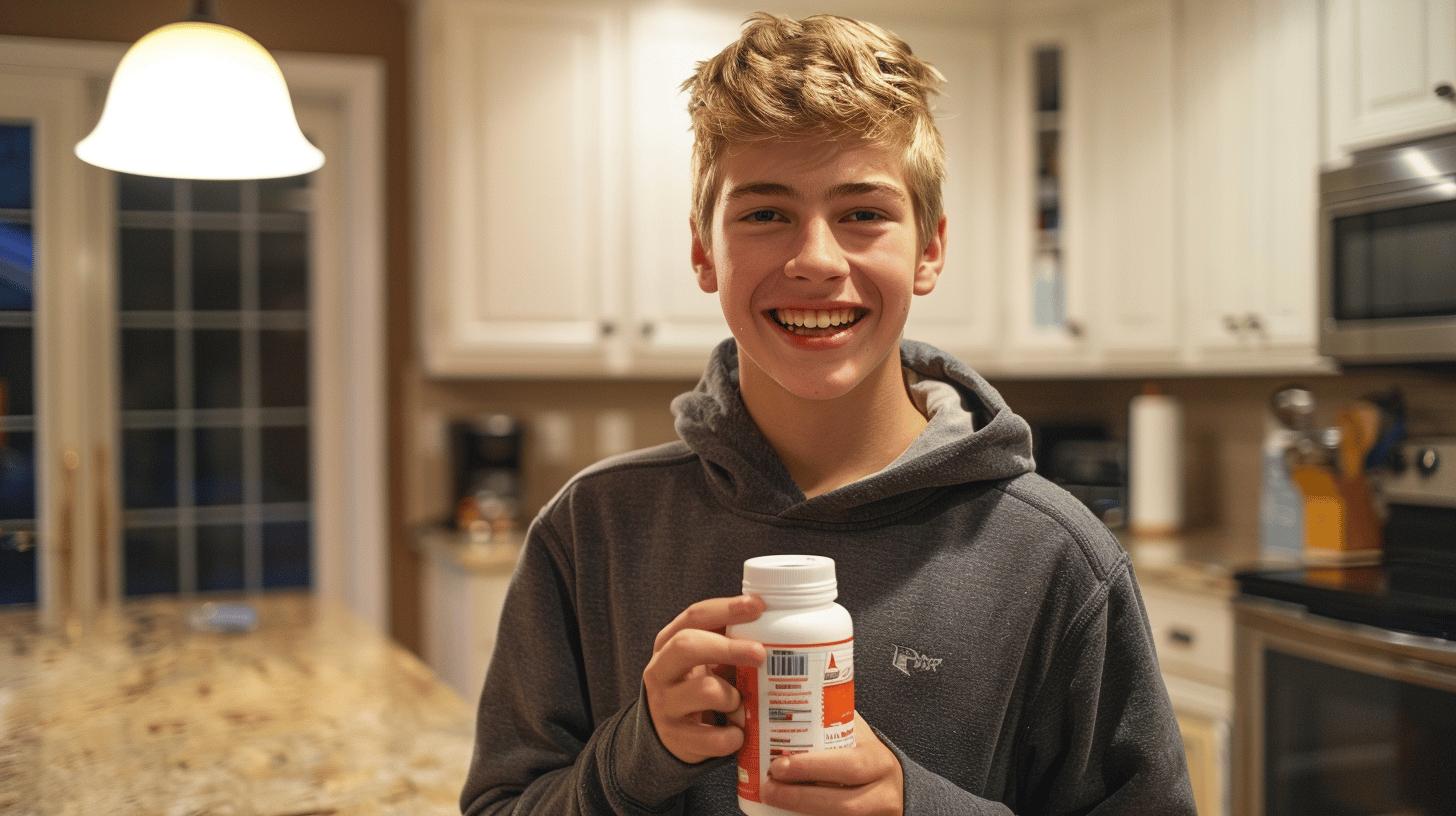Do teenagers really need to take vitamins, or is it just a marketing gimmick? While pediatricians argue that a balanced diet often suffices, certain vitamins like D, B12, and omega-3 fatty acids can offer significant health benefits. As teens navigate critical growth stages, understanding the role of these essential vitamins can be the key to boosting both their physical development and overall well-being. This guide breaks down the most crucial vitamins for teenagers, shedding light on how they can support the unique needs of this formative period.
Essential Vitamins for Teenagers
Vitamins are crucial for teenagers as they support growth, development, and overall health. While a well-balanced diet typically supplies necessary nutrients, certain vitamins can be beneficial to address specific needs during adolescence.
Vitamin D is vital for bone health, helping to absorb calcium and phosphorus. This is especially important during teenage years when bones are growing rapidly. Vitamin B12 is essential for energy production and the formation of red blood cells, which can help combat fatigue and support increased physical and mental activity. Omega-3 fatty acids are known to aid cognitive function and mental health, promoting better focus and reducing symptoms of anxiety and depression.
Pediatricians recommend supplements of these essential vitamins for teenagers who may not get enough from their diet. Proper intake ensures that teens meet their developmental milestones and maintain good health. Always consult a healthcare professional before starting any supplement regimen to determine the appropriate needs and dosages.
- Vitamin D: Supports bone health and calcium absorption
- Vitamin B12: Aids in energy production and red blood cell formation
- Omega-3 Fatty Acids: Enhances cognitive function and mental health
- Iron: Supports oxygen transport and prevents anemia
- Vitamin C: Boosts immune function and skin health
Best Multivitamins for Teenage Girls
Multivitamins are important for teenage girls as they provide essential nutrients that support various aspects of health. During adolescence, hormonal changes can cause fluctuations in nutrient needs, making it crucial to maintain adequate levels of vitamins and minerals. Multivitamins help balance hormones, support bone health, and improve skin function. Additionally, they can aid in energy production and overall growth, ensuring that teenage girls meet developmental milestones. While a balanced diet is the best source of nutrients, supplements can fill nutritional gaps, providing a safety net during periods of rapid growth and hormonal changes.
Multi-Max® Teen Her is one of the best options for teenage girls. It contains essential vitamins and minerals such as iron, vitamin B6, magnesium, calcium, and vitamin D3. These nutrients specifically support female health by aiding in energy production, enhancing skin function, and promoting bone health. Iron helps prevent anemia, which can be common during menstruation. Vitamin B6 and magnesium play a role in regulating mood and alleviating PMS symptoms. Calcium and vitamin D3 are crucial for developing strong bones, which is particularly important during the teenage years.
| Nutrient | Benefit |
|---|---|
| Iron | Prevents anemia and supports oxygen transport |
| Vitamin B6 | Regulates mood and reduces PMS symptoms |
| Magnesium | Supports energy production and muscle function |
| Calcium | Essential for bone development and strength |
| Vitamin D3 | Enhances calcium absorption and bone health |
Best Multivitamins for Teenage Boys

Multivitamins are essential for teenage boys, particularly those who lead active lifestyles or participate in sports. These boys have increased nutritional needs to support their energy expenditure, muscle growth, and overall development. Multivitamins can fill nutritional gaps that might not be met through diet alone, ensuring they receive the necessary nutrients to maintain optimal health and performance. For teenage boys aiming to gain weight healthily, vitamins and minerals play a crucial role in metabolism, muscle function, and recovery. Supplements can provide a reliable source of these nutrients, aiding in muscle development and enhancing athletic performance.
Multi-Max® Teen Him is specifically formulated to meet the nutritional needs of teenage boys. It includes essential vitamins and minerals such as vitamins B5, B6, B12, magnesium, and iron. Vitamin B5 and B6 are vital for energy production and metabolism, helping boys stay active and focused. Vitamin B12 supports red blood cell formation and neurological function, which is crucial for maintaining energy levels. Magnesium is essential for muscle function and recovery, while iron helps prevent anemia and supports oxygen transport within the body. These nutrients collectively support the immune system, skin health, and overall growth and development, making Multi-Max® Teen Him an excellent choice for teenage boys.
- Vitamin B5: Enhances energy production and metabolism
- Vitamin B6: Supports energy production and brain function
- Vitamin B12: Aids in red blood cell formation and neurological health
- Magnesium: Essential for muscle function and recovery
- Iron: Prevents anemia and supports oxygen transport
- Zinc: Promotes immune function and skin health
Natural and Organic Vitamin Options for Teenagers
Natural and organic vitamins offer several benefits for teenagers. These vitamins are derived from whole food sources, which means they contain fewer synthetic ingredients and more nutrients in their natural state. This can be particularly advantageous for teens with dietary restrictions or those looking to avoid artificial additives. Natural vitamins are often easier for the body to absorb and utilize, leading to better overall health outcomes.
One excellent example of a natural and organic vitamin product is the Naturelo Whole Food Multivitamin for Teens. This product contains a comprehensive blend of vitamins A, C, D, E, and B complex, all sourced from fruits and vegetables. These vitamins support various aspects of health, from immune function to energy production and skin health. Vitamin A, for instance, is vital for vision and immune function, while vitamin C boosts the immune system and aids in collagen production. Vitamin D supports bone health, and the B complex vitamins are crucial for energy metabolism and red blood cell formation. This makes Naturelo Whole Food Multivitamin a suitable choice for teens who prefer natural supplements.
- Supports overall health with nutrients in their natural state
- Contains fewer synthetic ingredients
- Suitable for teens with dietary restrictions
- Enhances absorption and utilization of vitamins
- Derived from whole food sources, ensuring a comprehensive nutrient profile
Vitamin Dosage Recommendations for Teenagers
The American Academy of Pediatrics suggests that healthy teenagers who consume a well-balanced diet typically do not need additional vitamin supplements. This is because a diverse diet can usually provide all the necessary nutrients required for growth and development. However, there are circumstances where supplements might be beneficial. For example, teenagers with dietary restrictions, certain medical conditions, or those who do not have consistent access to a variety of foods might need supplements to meet their nutritional needs. It's crucial to focus on specific vitamins that are often lacking in adolescent diets, such as vitamin D, B12, and B6.
Consulting healthcare professionals for personalized advice is essential before starting any supplement regimen. Each teenager's nutritional requirements can vary based on their health status, lifestyle, and dietary habits. A healthcare professional can provide tailored recommendations to ensure that the dosage is both safe and effective. This approach helps prevent potential issues related to vitamin overconsumption, which can lead to toxicity and other health problems. It's always best to follow professional guidance to achieve optimal health outcomes.
| Vitamin | Recommended Daily Allowance (RDA) |
|---|---|
| Vitamin D | 600 IU |
| Vitamin B12 | 2.4 micrograms |
| Vitamin B6 | 1.2-1.8 milligrams |
| Iron | 11-15 milligrams |
| Calcium | 1,300 milligrams |
Common Vitamin Deficiencies in Teenagers and How to Address Them

Vitamin deficiencies are prevalent among teenagers due to growth spurts, dietary habits, and lifestyle choices. Three common deficiencies in this age group are vitamin D, iron, and vitamin B12. These deficiencies can hinder growth, development, and overall health, making it crucial to identify and address them promptly.
Symptoms of vitamin D deficiency include fatigue, muscle weakness, and bone pain. Iron deficiency, often leading to anemia, can cause fatigue, poor concentration, and pale skin. A lack of vitamin B12 may result in fatigue, neurological changes, and weakened immunity. Addressing these deficiencies involves integrating nutrient-rich foods into the diet and, if necessary, taking supplements. For instance, vitamin D can be obtained from dairy products, fatty fish, and fortified cereals. Iron is abundant in red meat, beans, and leafy greens, while vitamin B12 is primarily found in meat, dairy products, and fortified foods.
To combat these deficiencies, teenagers should focus on a balanced diet enriched with foods high in the required vitamins. Consulting a healthcare professional for appropriate supplementation can also be beneficial. Below is a list of foods that are rich in these essential vitamins:
- Dairy Products: Rich in vitamin D and calcium
- Leafy Greens: High in iron and vitamin C
- Meat: Excellent source of iron and vitamin B12
- Fortified Cereals: Enriched with vitamins D and B12
- Beans: Provide iron and other essential nutrients
Safety Considerations When Taking Vitamin Supplements
Most over-the-counter vitamin supplements are generally safe for teenagers. However, consuming too much of certain vitamins can be harmful. For instance, excessive intake of vitamin A can lead to toxicity, presenting symptoms such as dizziness, nausea, and even more severe health issues. It's crucial for teenagers to understand that more is not always better when it comes to vitamins. Adhering to the recommended dosages ensures they reap the benefits without encountering adverse effects.
Consulting healthcare professionals before starting any vitamin supplement regimen is vital. Each teenager's nutritional needs are unique, and a healthcare provider can offer personalized advice based on individual health status and dietary habits. This guidance helps avoid the pitfalls of megadoses and ensures the safe and effective use of vitamin supplements. Always follow the dosage instructions on the supplement packaging and seek professional advice to optimize health and well-being.
Final Words
Understanding essential vitamins for teenagers can significantly impact their growth and development. This article outlined the importance of vitamins like D, B12, and omega-3s, the best multivitamins for teenage girls and boys, and natural options.
It also covered dosage recommendations, common deficiencies, and safety considerations. For teenagers to thrive, it's crucial to balance diet with appropriate supplements.
Prioritizing vitamins for teenagers can promote better health, energy, and well-being. It's always wise to consult healthcare professionals to tailor these recommendations to individual needs.
FAQ
Should a 14-year-old take vitamins?
A: Pediatricians recommend that healthy teens with balanced diets generally do not need vitamins. However, vitamins like vitamin D, B12, and omega-3 fatty acids can support growth and development if dietary intake is insufficient.
What are the best multivitamins for teenage girls?
A: Multi-Max® Teen Her contains vitamins and minerals like iron, B6, magnesium, calcium, and D3. These nutrients support female health, skin function, energy production, and bone health, addressing hormonal changes in teenage girls.
What are the best multivitamins for teenage boys?
A: Multi-Max® Teen Him includes vitamins B5, B6, B12, magnesium, and iron. These nutrients help with energy production, immune support, skin health, and growth, especially for active teenage boys and athletes.
Are there natural and organic vitamin options for teenagers?
A: Yes, Naturelo Whole Food Multivitamin for Teens contains vitamins A, C, D, E, and B complex from whole food sources like fruits and vegetables. These are suitable for teens with dietary restrictions or preferences for natural supplements.
What vitamins are good for puberty?
A: Key vitamins for puberty include vitamin D for bone health, vitamin B12 for energy production, and omega-3 fatty acids for cognitive function. These vitamins support overall growth and development during teenage years.
What are the best vitamins for teenage growth?
A: Vitamins D, B12, and omega-3 fatty acids are beneficial for teenage growth. Vitamin D supports bone health, vitamin B12 aids in energy and red blood cell production, and omega-3 fatty acids enhance cognitive function and mental health.
Should teenagers take multivitamin gummies?
A: Multivitamin gummies can be an easier way for teens to get essential nutrients if they are picky eaters or have specific dietary restrictions. However, they should still consult healthcare professionals to ensure balanced nutrient intake.
What are the benefits of specific vitamins for teenage girls' hormones?
A: Vitamins like B6 and D3 can help with hormone regulation. B6 supports the production of neurotransmitters that balance hormones, while D3 aids in calcium absorption, influencing overall hormonal health during teenage years.
What are the best supplements for teenage growth?
A: Omega-3 fatty acids, vitamin D, and zinc are among the best supplements for teenage growth. These nutrients support bone health, cognitive development, and immune function, contributing to overall growth during teenage years.
What are common vitamin deficiencies in teenagers?
A: Common deficiencies in teenagers include vitamin D, iron, and vitamin B12. Symptoms can include fatigue, poor concentration, and weakened immunity. Address deficiencies through dietary changes and, if necessary, supplements.
What are the safety considerations when taking vitamin supplements?
A: While most over-the-counter vitamins are safe, excess intake can be harmful. For example, too much vitamin A can lead to toxicity. It is crucial to consult healthcare professionals and follow recommended dosages to avoid risks.

